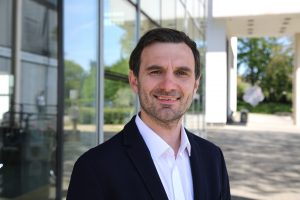Invited speakers

Prof. Beata Javorcik (University of Oxford, European Bank for Reconstruction and Development)
Beata Javorcik is Chief Economist of the European Bank for Reconstruction and Development (EBRD) in London. She is on leave from the University of Oxford, where she is the first woman to hold a Statutory Professorship in Economics. She is also a Fellow of All Souls College, Oxford and the Director of the International Trade Programme at the CEPR in London. She is a member of the Scientific Advisory Committee at ifo Institute, University of Munich, as well as of the Executive and Supervisory Committee of CERGE-EI in Prague. Before taking up her position at Oxford, she worked at the World Bank in Washington DC, where she focused on research, lending operations and policy advice. She holds a Ph.D. in Economics from Yale and a B.A. in Economics (Summa cum Laude) from the University of Rochester.
 Prof. Hanna Godlewska-Majkowska (SGH Warsaw School of Economics)
Prof. Hanna Godlewska-Majkowska (SGH Warsaw School of Economics)
Profesor nauk ekonomicznych, pełnomocniczka Rektora SGH ds. równego traktowania, dyrektorka Instytutu Przedsiębiorstwa w Kolegium Nauk o Przedsiębiorstwie SGH. W latach 2016-2020 pełniła w SGH funkcję prorektora ds. współpracy z otoczeniem.
Aktualnie specjalizuje się w badaniach nad inteligentnymi organizacjami w jednostkach samorządu terytorialnego i biznesie. Prowadzi wieloletnie badania nad lokalizacją przedsiębiorstw, przedsiębiorczością lokalną i regionalną oraz atrakcyjnością inwestycyjną regionów. Jest autorką ponad 200 publikacji. Wypromowała 6 doktorów.
Badania prowadzone przez prof. dr hab. H. Godlewską-Majkowską i jej zespół są od 2008 roku podstawą opracowania raportów atrakcyjności inwestycyjnej polskich województw, powiatów i gmin na zamówienie PAIH (d.PAIIZ) oraz corocznego raportu „Gmina na 5!”.
Tytuł wystąpienia/ Title of the presentation: Od teorii do praktyki: Jak inteligentne organizacje kształtują przewagi konkurencyjne w biznesie i samorządzie

Prof. Andrés Rodríguez-Pose (London School of Economics and Political Science)
Andrés Rodríguez-Pose is the Princesa de Asturias Chair and a Professor of Economic Geography at the London School of Economics. He is the Director of the Cañada Blanch Centre LSE and was Head of the Department of Geography and Environment between 2006 and 2009. He is also a Visiting Professor at the Centre for Innovation Research, University of Stavanger, Norway.He has been President of the Regional Science Association International (RSAI) (2015-2017) and served as its Vice-President in 2014. He was also Vice-President (2012-2013) and Secretary (2001-2005) of the European Regional Science Association.He has a long track record of research in regional growth and inequality, fiscal and political decentralization, institutions, discontent and populism, innovation, migration, and development policies and strategies. This research has been frequently used by policy- and decision-makers, acting regularly as advisor to international organizations and governments.
 Prof. Paweł Czapliński ( University of Szczecin)
Prof. Paweł Czapliński ( University of Szczecin)
Paweł Czapliński jest geografem społeczno-ekonomicznym, profesorem Uniwersytetu Szczecińskiego. Specjalizuje się w zagadnieniach dotyczących organizacji i dynamiki struktur przestrzennych polskiego przemysłu, ze szczególnym uwzględnieniem elementów błękitnej gospodarki.
Tytuł wystąpienia/ Title of the presentation: Dojrzałość polskiego przemysłu

Prof. Robert Panitz (University of Koblenz)
Robert Panitz is a Junior Professor in Technology and Innovation Management at the University of Koblenz in Germany. He also serves as a guest professor at the Heidelberg Center Latin America in Chile. In 2020, he held an interim professor position at the University of Bremen. From 2010 to 2023, he worked at Heidelberg University in the field of Economic Geography. He is a member of the German Society for Social Networks (DGNet). His research focuses on social and organizational structures and processes that foster innovation and technology development, as well as the economic and social effects of such advancements. Methodologically, he has a particular interest in social network analysis. His current topical interests address the changes in the divisions of labor in global value networks due to digitization, new regulations, and green technology transitions.
Title of the presentation: Challenges between global networks and regions in transition
 Międzynarodowa Konferencja Naukowa
Międzynarodowa Konferencja Naukowa